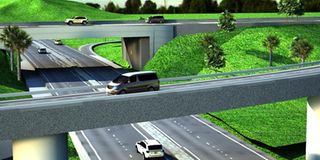How Kampala-Jinja Expressway construction will affect residents

An artistic impression of the Butabika final close that is part of the Kampala-Jinja Expressway
What you need to know:
- The government valuer said approvals of the resettlement action plan study by his office have been expedited and they will be disclosed to the affected persons and payments will begin in February next year.
- The Kampala-Jinja section will start at Shoprite, Lugogo Nakawa Division, going through Kyambogo where it will turn into Kinawataka and Kasokoso in Kira Municipality, Namanve and Mukono and end at the new Jinja bridge in Njeru, Buikwe District.
Kampala. The displacement and resettlement impact of the construction of $1.1b (about Shs3.9 trillion) Kampala-Jinja Expressway is expected to be a big one, according to officials from the Uganda National Roads Authority (Unra).
Pedestrians, slow moving vehicles and those with powered wheelchairs will not be allowed to use the high speed expressway once it is completed.
The design speed of the road will be up to 120kmph between Kampala and Jinja inclusive of an urban expressway section of design speed of up 100kmph.
The senior government valuer, Mr Benon Okumu, said the 95km road will comprise two distinct sections, the Kampala-Jinja mainline which is 77km and the Kampala Southern Bypass of 18km.
The Kampala-Jinja section will start at Shoprite, Lugogo Nakawa Division, going through Kyambogo where it will turn into Kinawataka and Kasokoso in Kira Municipality, Namanve and Mukono and end at the new Jinja bridge in Njeru, Buikwe District.
Mr Okumu said from Lugogo [Shoprite and Game], the road will extend 30 metres on the right and 30 metres on the left from the centre of the already existing Kampala-Jinja highway. He said about 10,000 people will be compensated and that Shs400b has already been secured for the exercise.
Seen as a good venture and engine of progress, the Kampala-Jinja expressway is facing increased criticism from residents in terms of its environmental impact.

An artistic impression of Kinawataka overview that is part of the Kampala-Jinja Expressway.
The Kasokoso village chairperson, Mr Musa Sekigudde, said the proposed routing of the highway will encroach on the ecological resources including green belts, pollute the environment with the emissions of carbondioxide and carbonmonoxide.
“Hazardous materials such as fuel, oil, acids, etc, may drain into streams and drainage areas causing pollution to surface and ground water which further causes the loss of lives,” said Mr Sekigudde.
He said although they will be compensated by Unra, the poor air quality caused by gas emissions that damage their lives will remain.
“These impacts, including the noise and dust from construction, the use of non-renewable aggregates, the loss of natural habitats and green space, destruction of the fertility of our land should be looked into,” Mr Sekigudde added.
The Unra resettlement action plan head, Mr Moses Muwanga, said the project would cause the biggest displacement in urban and rural areas; industries, schools, hospitals and households.
He said the project, which will take five years to complete, will affect livelihoods, adding that a convenient programme for relocating people and businesses and giving them 15 per cent disturbance fee has been set up by Unra.
“We have been doing limited road projects with low resettlement but this is going to be massive and we don’t want to delay this project. It will affect livelihood and some places that provide services such as hospitals, schools, hotels,” Mr Muwanga said.
“Properties to be affected have been evaluated and are being re-evaluated, assessment forms will be signed, and local leaders have been sensitised. We expect that between now and February, no other development will be added. We have a clear view of properties affected, a development order is in place,” Mr Muwanga said.
He said one year before construction starts, people with utility services have been asked to divert their cables away from the designed routes.
“We have asked for cost estimates for diversions and funding for compensation is provided for it. Telecom companies must bring in their concerns. There is a proposal now to have common ducts for telecom companies,” Mr Muwanga added.
The government valuer said approvals of the resettlement action plan study by his office have been expedited and they will be disclosed to the affected persons and payments will begin in February next year.




